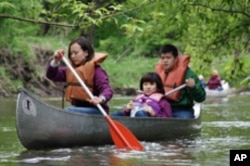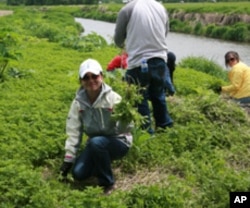The Mississippi is the major river system in the United States. The Yangtze is China's longest river.
Although a world apart, the two waterways share conservation concerns that provide a cultural bridge between students in the United States and China, as well as from around the world.
Cross-cultural experience
The Mississippi flows almost 3,800 kilometers from a small lake in Minnesota, gathering the waters of 250 other rivers and streams before reaching the Gulf of Mexico.
In mid-May, as spring flowers began to open, about 41 students from a dozen colleges, mostly in the Midwest, explored a section of the river in Wisconsin and Iowa, to learn about the environment, and each other.
The students, from the U.S., China and around the world, came to join the River Spirit Exchange program.
The cross-cultural educational experience - set up by the University of Wisconsin, Madison-based Environment and Public Health Network for Chinese Students - focuses on the Mississippi and China's longest river, the Yangtze.
The International Crane Foundation is one of the groups supporting this sister-river program. Jeb Barzen, the foundation's chief wildlife biologist, gave the students a tour of the preserve.
She told them that, to successfully breed and produce healthy young, the giant birds need to stop in the middle of their long migration to rest, eat, socialize, mate, and build their strength for their long flight north. The Mississippi and its tributaries provide that sanctuary.
Barzen explained while these students learn about the problems challenging the Mississippi and Yangtze, they will also learn about the challenges - and importance - of bridging each other's culture.
"Americans in the Midwest, they're very funny," he told them. "They do things very differently from what you might expect in China. Or if Americans interact with you in China, they might think, 'Whoa, they do things very differently in China.' But what's important is that we are more similar to each other than we are different."
A larger lesson
This three day get-together featured story-telling, hiking, camping and canoeing, all part of a larger lesson about conservation projects that can be used on both the Yangtze and Mississippi.
After the group met at the Crane Foundation preserve, they headed south to canoe a stretch of the Kickapoo River that winds its way through southwestern Wisconsin before joining the Mississippi. They paddled along a stretch of the Kickapoo River, where a 20-year preservation venture stopped encroachment by developers and protected the natural setting of the waterway.
The effort was led by Mark Cupp, director of the Lower Wisconsin State Riverway Board.
He told the group he was proud of its success. "I believe because of the Riverway Project that we can be assured that our grandchildren's grandchildren will be able to set a canoe in the singing waters of the Wisconsin River and be able to experience the same beauty that we can see today and that those Native Americans saw from those many generations before."
But accomplishing that was a contentious process.
Cupp told the students setting rules for loggers, farmers, landowners and developers caused anger and even a few threats of violence between the two sides.
"In fact, near the end of the planning process, folks from Madison were called 'urban maggots' and they responded by calling the locals 'club wielding zealots'," said Cupp.
Barzen, of The Crane Foundation, recounted similar difficulties in China while trying to preserve habitat along the Yangtze River. China's river is threatened by dams and other water diversion projects, as well as fish farming, deforestation, and the cultivation of surrounding land for farming and grazing.
"Every year we would talk with the farmers," he recalled, "and they would say 'What can I do? I have no solution. I have to feed my family.' We would say 'But you know this technique is not good for you because you get a little bit of food now but it makes you poor next year or two years. And the farmer would say 'Yes, I know, but my children need to eat next month, not next year.'"
A cooperative approach
The message Barzen wants students to hear is, look for solutions from the other side. Don't treat them as adversaries.
"So these ideas of solutions including people are important for conservation. They're important for us as people to survive as well," he said. "This wetland is just a very small example of exactly the same thing that you're talking about on a very big scale, for the Yangtze, for the Mississippi, for the other river systems that exist in the world."
The president of the Environment and Public Health Network for Chinese Students, Xiaojun Lu, said the Mississippi and Yangtze Rivers are uniting these students from opposite ends of the earth.
"They got to know each other during the exchange," he said. He hopes that, by working together, they will find solutions to preserving these waterways."So I think that certainly helped people to change their thinking and so they can look beyond not just for now but for the future."
The students on the River Spirit Exchange ended their first night with singing and stories around the campfire. Organizers say the success and spirit of this first gathering of students will lead to other trips, including one down the Yangtze.
(Correspondent Gil Halsted contributed to this report.)







